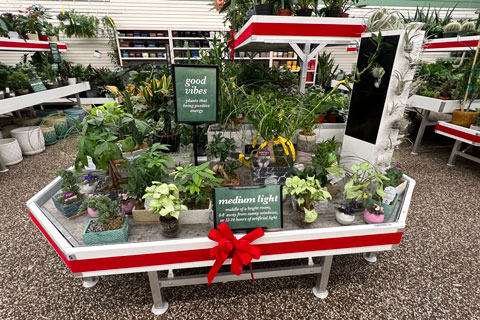3/1/2023
Marketing Plants to Engage the Conscientious Consumer
Alicia l. Rihn, Melinda j. Knuth, Bridget k. Behe & Charles R. Hall

From everyday utilitarian items to luxury goods, consumers are becoming increasingly conscientious about the products they purchase and the potential impact those purchases have on the environment and society.
People exhibit varying levels of consideration for future consequences (low to high) of their current actions, which can influence their purchasing decisions. A recent study funded by the USDA-ARS Floriculture & Nursery Research Initiative (FNRI) addressed the relationship between U.S. consumers’ future conscientiousness, mental health ratings and different types of plants purchased (i.e., annuals, perennials, woody ornamentals, indoor foliage). Insights from these relationships can be used to better tailor green industry marketing messages to resonate with more conscientious consumer groups.
Pictured: Simple yet effective, feel-good messaging at the holidays from the re-designed Petitti Garden Center store in Tallmadge, Ohio.
Several key findings resulted from this research. First, plant purchase and plant spending are positively related regardless of the plant types purchased. Relatedly, if a person purchases one type of plant, they’re more likely to purchase more types of plants. Likely this relationship comes from gaining experience and enjoyment from growing the original plant, which then gives them confidence to expand and try a variety of plant types.
Another trend was a positive relationship between mental health and highly conscientious behavior. As noted earlier in this series, mental health is related to positive perceptions for future outcomes, which aligns with participating in conscientious behavior and values.
All Plant Purchases Matter
Another important finding was that mental health and level of conscientious behavior were impacted differently, depending on the type of plant purchased. Purchasing annual plants was positively related to high mental health ratings, indicating that people who buy annual plants tended to exhibit greater optimism for the future. Interestingly, purchasing indoor foliage plants was negatively related with low conscientious behavior, but positively related with high conscientious behavior, meaning people who bought indoor foliage plants were taking actions to improve future outcomes. Additionally, purchasing woody ornamental plants was positively related with intermediate conscientious behavior, meaning individuals who bought woody ornamental plants were exhibiting some conscientious behavior, but not to the degree of annual or indoor foliage plant purchasers.
The results of this research have several marketing message implications. First, given that the type of plant purchased positively impacted participants’ likelihood of diversifying into buying other types of plants, any action to encourage plant purchases positively impacts the entire ornamental plant industry regardless of plant types sold. Thus, helping plant purchasers make informed decisions to have positive outcomes (e.g., the plant aligns with their home environment and lifestyle, correct fertilizer/media), providing educational materials or information sources to aid them with their purchases, highlighting the benefits of plant ownership, identifying obtainable positive signs to watch for that indicate that the plants are doing well (e.g., new leaves, buds, etc.), and introducing them to other plant-related opportunities, are all examples of proactive strategies to encourage additional plant purchases.
Secondly, since annual plants improved mental health, there’s an opportunity for the industry to highlight the benefits of annuals (e.g., instant gratification, constant color from blooming and seasonal décor applications) to encourage better mental health and well-being. Examples of benefits include: 1) promotional messaging related to beautifying your surroundings to give yourself a mental boost; 2) demonstrations in-store highlighting different combinations to exhibit creative ideas; 3) customized “recipes” of different plant combinations to complement any style; and 4) seasonal packages where customers subscribe to updated annual plantings depending on the season.
Another potential marketing message is related to the environmentally conscientious behavior associated with indoor foliage plants, particularly market segments that make purchases that are more environmentally friendly, sustainable or benefit the community (e.g., activities that have positive future consequences). Pairing indoor foliage plants with communications about sustainable production practices, health-related benefits, community benefits and so forth is a means of leveraging this relationship and these consumers’ interest in improving future outcomes.
Together, this research provides insights into the relationship between consumers’ plant purchasing behavior, mental health and conscientious behavior to provide inspiration to green industry firms as they consider ways to resonate with their customer groups and improve their marketing strategies. Customers are shaping the future through their purchasing decisions, so being aware of factors driving their behavior helps keep your eyes to the future and opportunities that may arise. GP
Alicia Rihn is an assistant professor in the Department of Agricultural and Resource Economics at the University of Tennessee Knoxville. Melinda Knuth is an assistant professor in the Department of Horticultural Science at North Carolina State University. Bridget K. Behe is a professor of horticultural marketing in the Horticulture Department at Michigan State University. Charlie Hall is a professor and Ellison Endowed Chair holder in the Department of Horticultural Sciences at Texas A&M University.
This Article Series
This story is one of three this winter from these excellent researchers. Here’s what you may have missed:
January: The value of a plant depends on whether the buyer is a novice or expert gardener.
February: Research shows connections between mental health, plant purchases and optimism about the future.